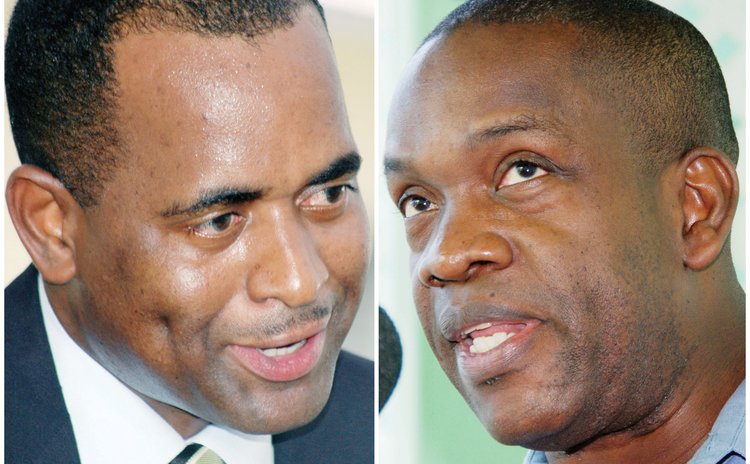Leadership:Linton vs Skerrit
Leadership is really everything to political parties in Dominica, polls say

There is nothing to suggest that things are falling apart in Lennox Linton's United Workers Party (UWP), a point strengthened by a recent poll by Alex Bruno, which found that 44 per cent of people resident in Dominica voted for the party in the last election, compared with 37 per cent for the ruling Dominica Labour Party (DLP), with more than half (55.9 per cent) saying they will stick with their party in the next election, compared with 19.7 per cent who said they would consider switching sides.
However, people close to both parties tell The Sun that outside the importation of votes – some say even with the importation of votes - the single biggest hindrance to a UWP victory over Roosevelt Skerrit's DLP is Linton himself.
The DLP's own polls, including the most recent one conducted in May of this year, have all shown that Skerrit is more popular that the party, and this was supported by Bruno's independent survey which found that Skerrit "is the party brand, its image, its symbol, its all".
"In several of the constituency (sic), samples swear that they indeed voted for candidate Skerrit, even if other names appeared on the ballot next to the D.L.P/shoe symbol. And there were instances where samples were fervently convinced that they in fact only voted for Skerrit, claiming that they vote so that Skerrit could become prime minister," Bruno wrote in his recommendations.
"What this suggests is that the party, as a unit, is not strong even as it continues to enjoy 'power' and may very well suffer from lack of operational structure in the absence of the current leader."
It is one of the key reasons, people close to the DLP tell The Sun, that Skerrit, who did not plan to contest the last general election, was persuaded to stay on, and is being pressed to continue for at least one more election, even after making his position clear that he will not run again.
And even though the last poll showed that he is twice as popular as Linton, a source familiar with both parties tells The Sun that Linton is making the DLP leader look a lot better than he really is.
"It makes sense for Skerrit to begin looking at succession. He is benefitting from Lennox's stupidity, but there comes a time when this will run out," says the person, who spoke on condition of anonymity because the issue of leadership is such a sensitive subject for both parties.
"The writing is on the wall and he needs to consider life after Linton because if they [UWP] identifies someone better than Linton he [Skerrit] will be in trouble," one person who stays up top of both parties says.
There is evidence that Dominicans don't doubt Linton's competence, based on the Bruno poll, which found that on the question of which political leader is more credible, persuasive and believable, the UWP leader polled 40.7 per cent, well within range of Skerrit's 43.3 per cent.
Yet, while Skerrit is charismatic, approachable and affable, Linton can seem repellent, arrogant, and aloof, a fact that even the most sober UWP backers admit.
"It's a very delicate issue and it's something that has been under discussion for some time. I have a lot of people in the professional class who tell me the same thing," one person working hard to get the UWP elected says.
"There is enough concern on the ground that Lennox does not have the right character to challenge Skerritt. As flawed as he [Skerrit] may be, it is suggested that the lack of charisma and the many legal challenges that Lennox has faced, he cannot match Roosevelt Skerrit," one other person adds.
Bruno would not go as far as to assert that Linton must go for the party to stand a chance, but his analysis is clear that the UWP must reshape its message, and Linton ought not be the person leading the charge.
"Distractions posed by Linton's legal troubles and opposition framed questionable public profile could erode the party electability chances if the leader and party do not take urgent stock," he writes in a strong suggestion that Linton does not have what it takes to win an election.
Long-time Skerrit critic Athie Martin does not want to engage in a discussion on personalities, saying he prefers to stick to the general issue of leadership, which he says has given way to populism across the Caribbean.
"We've actually lowered the bar on what we accept as leadership and have allowed populism to define leadership," he says.
"In my view, it's a distraction. It's a way to get away from a serious engagement with what's wrong and what's needed to fix it. So we turn leadership into populism and the net effect is all the comess that is happening is Dominica [is accepted]. It's not a question of 'who I like, who I don't like, Mister not saying hello to me'. I do not want to get embroiled into this one versus that one," Martin says.




